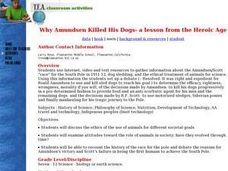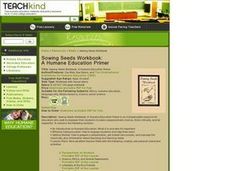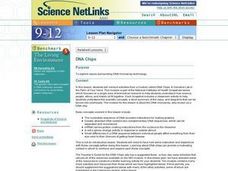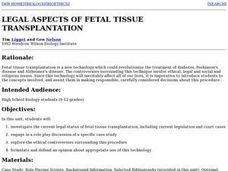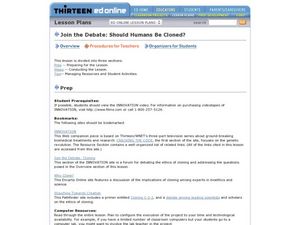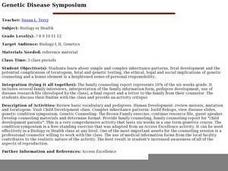Curated OER
"Tomorrow and Tomorrow and Tomorrow"
Do you want to live forever? After reading Kurt Vonnegut’s short story, “Tomorrow and Tomorrow and Tomorrow,” class groups adopt the roles of an ethics committee, product manufacturers, concerned scientists, and potential users of an...
Curated OER
Note-Taking: K.I.S.S. "Keep It Short and Simple"
Note-taking is an essential study skill, and it needs to be taught! In the context of a research project on energy sources, learners find multiple sources, evaluating, paraphrasing, and citing them correctly. Two lists with note-taking...
Curated OER
Why Amundsen Killed His Dogs
Students use Internet, video and text resources to gather information about the Amundsen/Scott race for the South Pole in 1911-12, dog sledding, and the ethical treatment of animals for science. They set up a debate to determine the...
Curated OER
Bioethics of Stem Cells
Young scholars complete a variety of activities as they examine the ethics behind stem cell research and use.
Curated OER
Sowing Seeds Workbook: A Humane Education Primer
Students are introduced to Humane Education. They analyze what it is and why it's important. Students access how to get involved in schools and address this issue. They explore how to become Eco-Friendly.
Curated OER
Bioethics And Fetal Tissue Research
High schoolers are introduced to the topic of fetal tissue implantation. In groups, they examine a case study and share information with the rest of the class. Then they do a reflective writing assignment to assess understanding of the...
Curated OER
Race and Genetics: An Integrated Approach
Students analyze racial issues related to the Human Genome Project. They participate in a mock symposium and write a reflection/position paper based on specific ethical principals.
Curated OER
Stimulus Response
Students explore the five steps in the stimulus-response pathway. They analyze the senses and the difference between animals' primary and secondary senses. Students collect information about animal behavior to debate the ethics of...
Curated OER
DNA Fingerprinting: You Be the Judge!
High schoolers use their knowledge of DNA fingerprinting to evaluate the use fingerprints in courts, and will address the ethics of establishing a national database of fingerprints.
Curated OER
DNA Fingerprinting: You Be the Judge!
Students explore DNA fingerprinting. Students discover how DNA fingerprinting is done and judge the validity. They evaluate the use of certain prints in courts and address the ethics of establishing a national database of fingerprpints.
Curated OER
Genetic Engineering
Students discuss the risks and benefits associated with biotechnology. In this biotechnology lesson, students discuss the role of genes in the body and brainstorm ethical issues relating to biotechnology. They read about an ethical issue...
Curated OER
Transgenic Mammals
Students are provided with a real life example of research in the areas of genetic and molecular biology. Students examine ethical considerations and related issues such as patent laws and regulatory procedures.
Curated OER
Maintaining Plant Genebanks
Students examine the use, costs, and the need for plant gene banks. The rationale for gaining ownership over scientific information and the implications of the developing nations' reliance on biotechnology is explored in this lesson plan.
Curated OER
DNA Chips
High schoolers explore issues surrounding DNA microarray technology. They focus on a single area of biomedical research to help them explain how science, people, ethics, and history all fit together. They analyze gene-expression data.
Curated OER
Legal Aspects Of Fetal Tissue Transportation
Students investigate the current legal status of fetal tissue transplantation. Students engage in a role play discussion of a specific case study. Students explore the ethical controversies surrounding this procedure. Students formulate...
Curated OER
Should Humans Be Cloned?
Students explore links on the Internet to collect facts about cloning then prepare an essay on their findings. In this research writing instructional activity students examine how to include their opinions on what they have found in...
Curated OER
What Is Engineering Design
Students investigate the concepts related to the practice of designing and building large scale buildings. They conduct research using the internet and other resources in order to apply mathematics and architectural design principals in...
Curated OER
Creating and Restoring Health Forests
Students explore how to create and restore healthy forests. Given a scenario, teams of students create a management plan to assist the forest in becoming healthy, safe, and appealing. Students consider the ecosystem, adaptations of the...
Curated OER
Creating The Blueprints
Students engage in a lesson in order to create blueprints to design an original floorplan. They use graphing paper and drawing tools to demonstrate knowledge of the lesson objectives. Students label and use the right kind of proportions...
Curated OER
Genetic Disease Symposium
Students research simple and complex inheritance patterns, fetal development and the potential complications of teratogens, fetal and genetic testing, and the ethical, legal, and social implications of genetic counseling.
Curated OER
The Talk Show: A Bioethical Dilemma About Neurological Disorders
Students explore neurological societal problems. They research, collect information and assess the ramifications of ethical, economic, political, and social issues. During a talk show simulation, students present their decisions.
Curated OER
Beyond Organic?
Students examine the critiques of organic agriculture and its production and marketing approaches. In this sustainable agriculture lesson students study how the ideas about ethics of the food system are changing.
Curated OER
Biotechnology
In this biology worksheet, students complete a crossword puzzle with 23 questions on biotechnology. They identify the benefits and ethical issues about biotechnology.
Curated OER
Introduction to Toxicology
Students explore the science of toxicology and the relationship between a toxic reaction (response) and amount of substance (dose). They observe two demonstrations illustrating the concept of dose-response.


